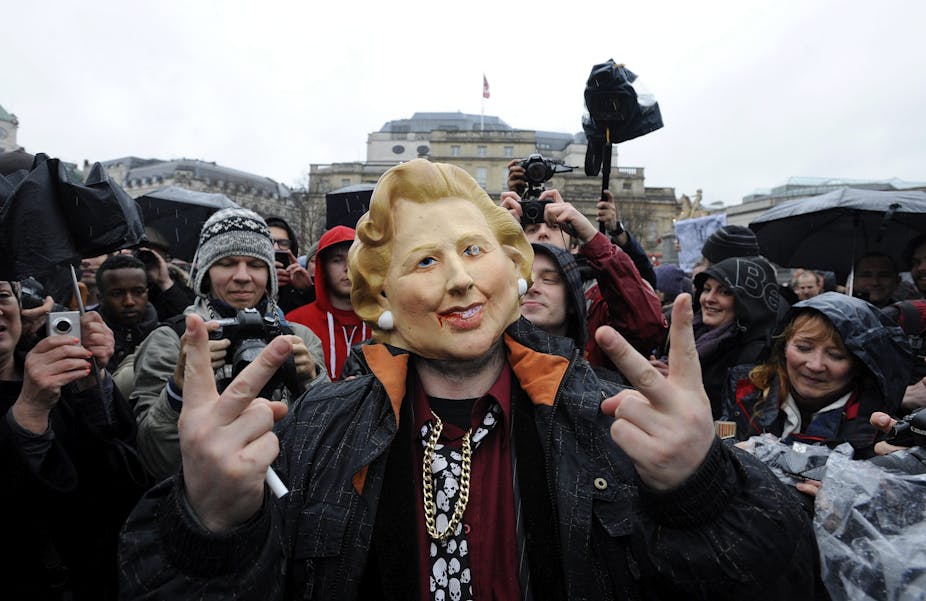After much controversy, the BBC last night played a seven second clip of Ding-Dong! The Witch Is Dead on its traditional Sunday night music chart show. The song had been the subject of an internet campaign to get it to number one on the British charts as a “celebration” of the death of former British prime minister Margaret Thatcher.
BBC Radio 1 controller Ben Cooper said the chart success of the Wizard of Oz track is a historical fact, and invoked this to justify the corporation’s decision to play the short clip accompanied with a news story on the controversy surrounding it. The move tried to placate those who think the song’s popularity is offensive, and others who view it as an expression of free speech.
In any event, the protest has ended up a damp squib: “Ding-Dong!” failed to reach number one, and came in at number two on the charts. Nevertheless, the Ding-Dong! controversy has energised a long running conflict over the purpose of history. In reviewing this debate, an irony emerges: Ding-Dong! downloaders play right into the hands of Thatcherism.
In his study What is History?, E.H. Carr claimed that seemingly trivial details become historical facts when historians decide that they are worth remembering. Often, these are political decisions, aimed at the future. Certainly, events around Thatcher’s passing are embroiled in a deeply political struggle to secure her legacy, one way or the other.
No-one has made this clearer than British historian Andrew Roberts. Roberts paints Thatcher as that rare historical figure who made change for the better, single-handedly. He credits the erstwhile “Iron Lady” with saving the UK economy, collapsing the Soviet Union and establishing an ideological project that will continue to steer Britain true into the future.
This isn’t surprising coming from the Trustee of the Thatcher Archive. Neither is it surprising that Roberts has been entrusted with the task of preserving Thatcherism. Skilled and popular, Roberts has revived whig history.
His History of the English Speaking Peoples book has been lauded as a brave return to an old idea that social historians have done their best to besmirch: that English history is a story of progress where everybody wins.
Roberts’ views on Thatcher suit the position that the people who matter in history are the great ones who make things happen. Not, then, others who think that downloading from iTunes is political action.
It was precisely this “great person” view that the social historian E.P Thompson sought to overturn in his magisterial book The Making of the English Working Classes. Reviewing the history of English popular dissent, Thompson showed why apparently irrational protests still revealed much about what it was like to experience key historical moments. These feelings are as much a part of history as are the thoughts of queens, kings and prime ministers.
So what would he say about the Ding-Dong! protest?
He certainly wouldn’t dismiss it. According to his research, spontaneous dissent was usually driven by several things. People in the same protest could be there for different reasons, having different aims. Ding-Dong! downloaders probably vary, from those who have well thought out reasons for their action, to others who don’t. Either way, Thompson would say their collective deed says something important about why Thatcher’s death has been a momentous occasion.
But Thompson wouldn’t validate Ding-Dong! downloaders either.

Like Roberts, Thompson, wrote his history with an eye on the present. He worried that commercial media were containing the tradition of English dissent. Surveying the 1960s, he bewailed the lack of ambition he saw among young people to challenge the commercial basis of the mass media, through which political discourse was increasingly channelled.
So, Thompson might well be horrified by the easy conflation of downloading and free speech. Even more so had he been around to witness the synthesis of consumerism and citizenship in British media policy. It’s been widely reported that Thatcherism primarily stressed individualism and individual responsibility. According to Sonia Livingstone and Peter Lunt, these ideas are the cornerstone of UK regulatory approaches. Generally speaking, regulators agree that if people want a richer public culture, then it’s up to audiences to make smart choices. Consumer and citizen are one and the same.
Margaret Thatcher would probably applaud a protest run through the mechanism of the media market. She’d also warn that Ding-Dong! downloaders are responsible for the consequences of their actions.
History might remember Ding-Dong! as proving one of two things: the existence of a basic incivility that only underscores the importance of the Thatcherite conviction that people must be ruled, or else that even her most ardent opponents agreed that expression is about buying stuff. What better tribute?

